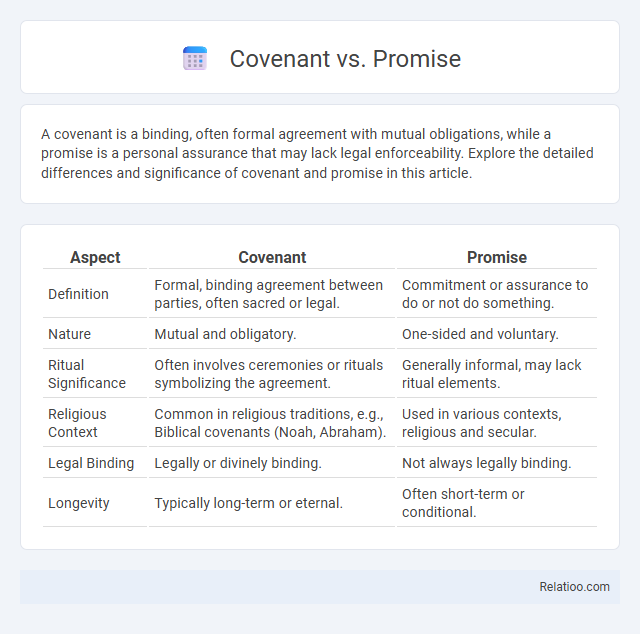A covenant is a binding, often formal agreement with mutual obligations, while a promise is a personal assurance that may lack legal enforceability. Explore the detailed differences and significance of covenant and promise in this article.
Table of Comparison
| Aspect | Covenant | Promise |
|---|---|---|
| Definition | Formal, binding agreement between parties, often sacred or legal. | Commitment or assurance to do or not do something. |
| Nature | Mutual and obligatory. | One-sided and voluntary. |
| Ritual Significance | Often involves ceremonies or rituals symbolizing the agreement. | Generally informal, may lack ritual elements. |
| Religious Context | Common in religious traditions, e.g., Biblical covenants (Noah, Abraham). | Used in various contexts, religious and secular. |
| Legal Binding | Legally or divinely binding. | Not always legally binding. |
| Longevity | Typically long-term or eternal. | Often short-term or conditional. |
Understanding the Concepts: Covenant vs Promise
A covenant is a formal, binding agreement often used in legal or religious contexts, establishing mutual obligations between parties, whereas a promise is a personal commitment made by an individual that may or may not involve legal enforceability. Covenants typically include specific terms, conditions, and consequences for breach, ensuring a structured and enforceable relationship, while promises rely more on trust and moral obligation without formal documentation. Understanding these distinctions highlights the covenant's role in creating lasting, reciprocal responsibilities compared to the generally unilateral and informal nature of promises.
Historical Origins of Covenants and Promises
Covenants trace back to ancient legal and religious traditions, often formalized through rituals and ceremonies to establish binding agreements between parties, reflecting a deep cultural and spiritual significance. Promises, in contrast, arise from everyday social interactions and moral obligations, typically relying on personal trust rather than formalized procedures. Your understanding of these concepts enhances by recognizing that covenants usually imply a stronger, more enduring commitment rooted in historical and communal contexts than the individual and flexible nature of promises.
Key Differences Between Covenants and Promises
Covenants establish binding, often formal agreements with specific obligations and conditions, while promises are personal commitments that may lack legal enforceability. In biblical contexts, covenants typically involve divine or solemn agreements creating lasting relationships, whereas promises can be simple assurances without a formalized structure. Understanding the key differences helps you recognize that covenants carry greater weight, often involving mutual responsibilities and consequences beyond the scope of ordinary promises.
Legal Implications: Covenant vs Promise
In legal contexts, a covenant is a binding agreement or contract that imposes specific duties or restrictions on parties, often recorded in property deeds or business contracts, and enforceable by law. A promise, while a commitment to act or refrain from acting, may lack the formal structure and legal enforceability of a covenant unless it meets contract requirements such as consideration and mutual assent. Courts typically enforce covenants in real estate and contractual obligations, whereas promises require clear evidence of intent and consideration to be legally binding.
Religious Significance of Covenants and Promises
Covenants in religious contexts represent sacred, binding agreements often established between God and humans, signifying divine commitment and moral obligations. Promises, while personal and meaningful, lack the formal, sacred structure that characterizes covenants in scriptures such as the Bible, where covenants shape spiritual identity and communal faith. Understanding the distinction enhances your grasp of theological narratives and the profound significance of God's unwavering commitments in religious traditions.
Covenants in Modern Agreements
Covenants in modern agreements serve as legally binding promises that impose specific obligations on parties, often seen in real estate, finance, and business contracts to ensure compliance and preserve standards. Unlike general promises, covenants include enforceable conditions with potential remedies for breach, reflecting a higher level of formal commitment. The use of covenants strengthens the predictability and stability of contractual relationships by clearly defining duties and restrictions.
The Role of Promise in Personal Relationships
Promises in personal relationships establish trust and mutual expectations, creating a foundation for emotional security and commitment. Unlike covenants, which are formal, binding agreements often used in legal or religious contexts, promises are typically informal yet powerful declarations that influence behavior and accountability between individuals. The role of a promise is crucial in fostering intimacy and reliability, reinforcing the ongoing connection through sincere assurance and consistency.
Examples of Covenants Throughout History
Ancient Israelite covenants, such as the Abrahamic covenant, established divine promises with specific obligations and signs like circumcision, highlighting a mutual commitment between God and His people. The Mosaic covenant introduced detailed laws and commandments, forming a foundational legal and moral framework that governed Israelite society and religion. Historical covenants often involved solemn agreements with sacred symbols and communal responsibilities, distinguishing them from simple promises by their formalized, binding nature in both religious and legal contexts.
When to Use a Covenant Versus a Promise
A covenant is a formal, legally binding agreement that outlines specific obligations and consequences, often used in contracts or real estate to ensure compliance over time. A promise, while morally or socially binding, lacks the enforceability and detailed terms characteristic of a covenant, making it suitable for personal commitments or informal assurances. Understanding when to use a covenant versus a promise depends on your need for legal enforceability and detailed terms, with covenants ideal for formal, long-term obligations and promises best for simple, trust-based commitments.
Conclusion: Choosing Between Covenant and Promise
Choosing between a covenant and a promise depends on the level of commitment and legal weight involved. A covenant carries binding obligations, often enforceable by law or tradition, while a promise is generally a personal assurance without formal enforcement. Your decision should align with the desired seriousness and consequences of your agreement.

Infographic: Covenant vs Promise
 relatioo.com
relatioo.com